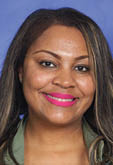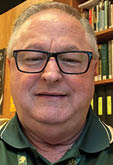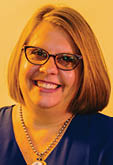
Just as they encourage students to focus on their leadership growth and educational development, advisers too never stop learning. Between teaching and advising, educators are no doubt stretched thin, but many still find time to enhance their professional learning. Here, three veteran teachers and experienced NHS advisers share what they have learned on the job, where they have gone for support, and what words of wisdom they have to offer advisers just stepping into the role.
Michelle Cureton, Lake Orion High School in Lake Orion, MI

A history teacher and districtwide diversity, equity, and inclusion coordinator in the Detroit suburb of Lake Orion, MI, Cureton began serving as an NHS advisor 13 years ago. At the time, she did not receive much guidance. Looking for information about the NHS constitution and bylaws and wanting support for advising an NHS chapter, she attended her first Leadership Experience and Development (LEAD) conference in Washington, D.C. She found answers to her questions about official NHS procedures and protocols and tapped into a community that continues to help both her and her chapter grow and develop. She started attending the conference each year and eventually became a teacher speaker, coming full circle by presenting about the very constitution and bylaws she learned about so long ago.
In addition to LEAD, joining the NHS scholarship review committee has been an unexpected resource that has helped Cureton to create meaningful experiences for her chapter. Each year, she reviews between 100 to 200 scholarship applications. From these, she learns about service projects and youth organizations that applicants have engaged in and brings these ideas to her own chapter. By reading the applications, she has learned about World Kindness Day, the organization Sources of Strength, and Ashoka Changemakers. Cureton also finds great ideas for programming from Advise magazine.
This past year, Cureton handed over the reins to two other capable advisers. Preparing and supporting them through their first year has helped her reflect on how much she herself has grown. One piece of advice that she offered them and suggests for all advisers? Get to know your community. Cureton has developed relationships with churches, community centers, and coalitions throughout her school district. Doing so has given her a sense of what her community needs, as well as the right people to connect with her students based on student interest. Once students are aware of these needs, Cureton enables the students themselves to determine the specific service-learning projects to pursue.
Cureton also suggests giving every member of the chapter an opportunity to serve as a leader. In her chapter, each member not only participates in a service project, but also leads a service project for five of their peers—an idea she first learned about at a LEAD conference. Students have helped kids with autism, volunteered at animal shelters, created a girl empowerment group at the local middle school, offered free yoga classes in the community, and put on a senior citizen prom. Every year, Lake Orion’s NHS chapter sponsors upwards of 30 to 40 projects.
Finally, Cureton encourages new advisers to fully understand the building blocks of NHS: its constitution and bylaws. Doing so enables them to not only ensure that foundational norms and rules are correct but to equally prioritize running a chapter in a way that is fair and equitable. Cureton emphasizes the importance of advisers evaluating criteria for accepting students to make sure the chapter is inclusive, incorporates diverse perspectives, and values those students who have a commitment to service as much as those who have performed well academically. “Being a part of NHS,” she explains, “will only bring the students up.”
Greg Brooks, The Villages High School in The Villages, FL

For the past 10 years, Brooks has taught social studies at The Villages. Before becoming a teacher he was a pastor, and he holds a doctoral degree in theological ethics. As a teacher and adviser, Brooks most values his relationships with students. He stepped into the adviser role in his second year at the school when the previous adviser decided to step down. Brooks jumped at the opportunity to advise so he could develop even more meaningful relationships with students.
In his early years as an adviser, Brooks found the NHS publications, constitution, and handbook incredibly helpful. He pored over these documents as he developed new processes for his chapter. During the past two years, he has looked to the online NHS community for ideas and support in adapting his chapter’s work to an online platform given the pandemic. For instance, he helped students record themselves reading children’s books to send to local elementary schools.
Brooks has found great support and fresh ideas through his relationships with other seasoned advisers. He’s developed this network by attending NHS conferences and summits. Even now, with eight years of experience, Brooks relies on the advisers in the other four high schools in his area to collaborate with on projects, bounce around ideas, and gather support as challenges emerge. Those in his network, he explains, “build each other up and calm each other down.”
Much like Cureton at Lake Orion High School, Brooks suggests that new advisers allow students to determine service projects based on their own individual passions. It’s the job of the adviser, he explains, to provide students with support and guidance on project management. For example, after his officers determine projects, Brooks helps them design a calendar and a list of short-term benchmarks so they can stay on track for reaching their goal. Sometimes supporting students means allowing them to “fall flat on their face” and learn from their mistakes, he explains. There have been multiple times where groups did not plan ahead and were left to scramble, or ultimately did not finish a project. But students learn from these experiences and approach projects differently the next time.
Being an adviser has enhanced Brooks’ experience as a classroom teacher as well. Having an opportunity to get to know students outside the classroom, while cleaning up local beaches, visiting assisted living centers, or Christmas caroling, allows him to see his students—and his students to see him—in a different light. His final piece of advice to new advisers? “Don’t stress. Have fun. And if you don’t get it all done the first year, you’ll have next year.”
Dana Hawkins, Port Aransas High School in Port Aransas, TX

A veteran teacher of 16 years, the last five of which have been at Port Aransas High School, Hawkins wears many hats in her job as an educator. That’s because Port Aransas, an island community off the coast of southern Texas, is a small school that graduates about 40 students each year. Besides teaching English, Hawkins also teaches a financial literacy course. Four years ago, she was asked to serve as the NHS adviser. Having been a member of NHS in high school, she was happy to step into this role.
At first, Hawkins relied heavily on her school’s previous advisers and the processes that they had created. She kept the annual service projects (a food drive and blood drive) that they had held in the past and continued to help students run meetings in the same way. She recommends that new advisers do not reinvent the wheel, especially if their chapter has been historically successful.
Hawkins says her greatest source of professional development has been from her students. She consistently asks them how they want their chapter to function and how they want to serve their community. This past year, it was particularly easy to learn from the students because she worked with an incredible NHS president who spent the summer creating a menu of service options for the school year. While this student naturally stepped into this leadership role, she recommends that new advisers find ways to support quieter students in stepping up to lead. One of the ways her chapter does this is by developing four task teams for service projects during the winter holidays, with a leader for each team.
According to Hawkins, it’s important for new advisers not to overwhelm students with expectations and to remember to let them enjoy their high school career. The students who apply to NHS, she explains, are those same students who are involved in multiple activities, and they shouldn’t be penalized for missing an NHS event for a track meet or a church retreat.
More than anything, she suggests that new advisers have fun, get to know who their students are outside the classroom, and recognize their leadership potential—but also see and appreciate their silly side.
Let the Students Lead
While their school communities and experiences with NHS differ, these advisers share similar ideas for growing as educators and supporting students as leaders. The most important lesson they teach their fellow advisers is a simple one: Allow the students to lead. The second lesson? Rely on a network of NHS advisers through online forums, conferences, and by building relationships with advisers in your region. And finally, have fun!
Beth Sondel is an education writer in Pittsburgh, PA.

